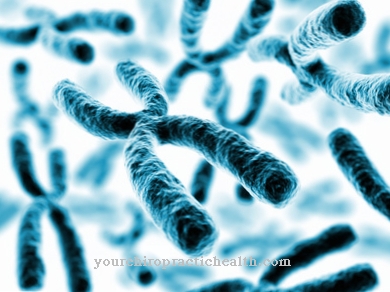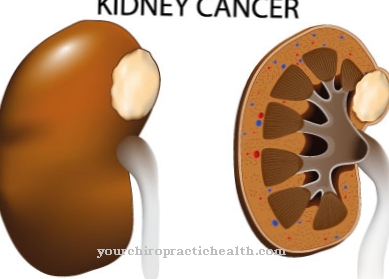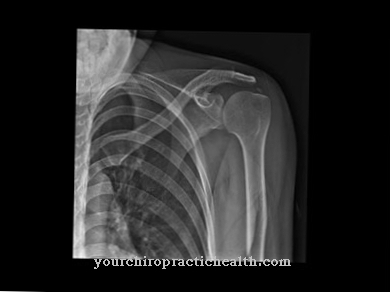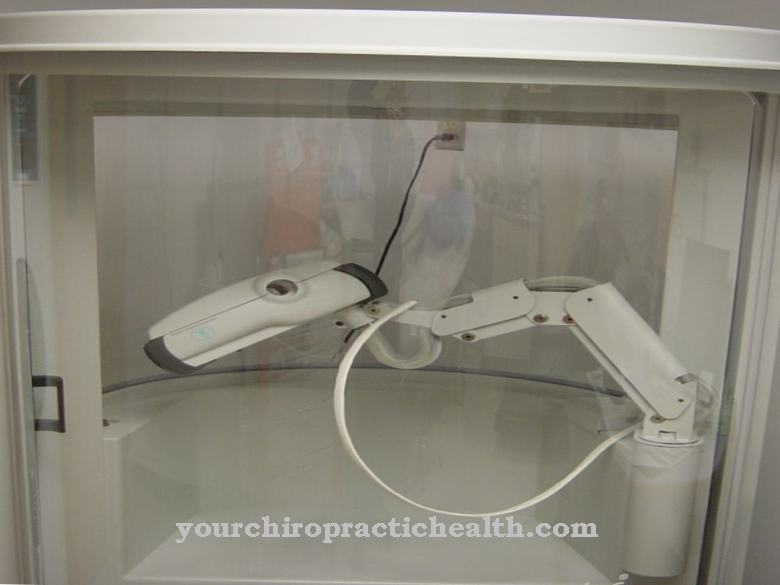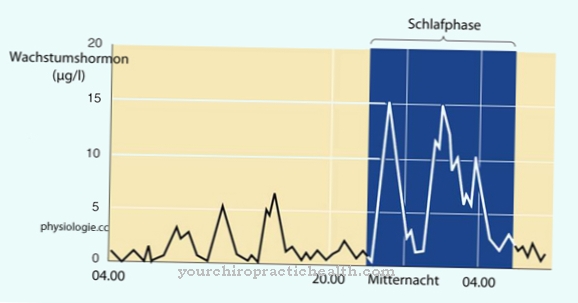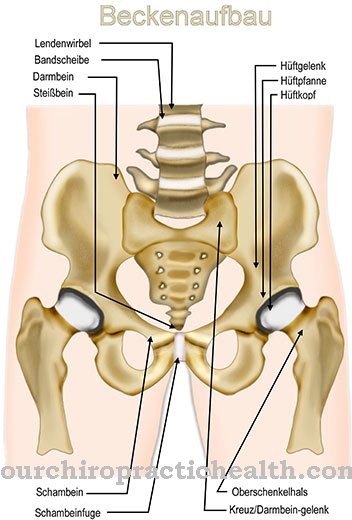The Left heart failure is also known as heart failure. The left ventricle is affected by the heart disease and there is an inability to meet the demands of the blood circulation.
What is left heart failure?

© peterschreiber.media - stock.adobe.com
The inability of the left heart to pump enough blood into the circulatory system causes blood to flow back into the lungs. The symptoms of left heart failure are derived from this pathophysiological process.
Heart failure usually starts with the left heart. If the disease progresses, the right heart is ultimately also affected. The doctor then speaks of right heart failure. If the entire heart muscle is affected by poor performance, it is called global insufficiency.
The term left heart failure means insufficient performance or working power of the left heart in relation to the demands of the entire blood circulation. Depending on the degree of left insufficiency, a distinction is made between rest insufficiency and exercise insufficiency. In the case of rest insufficiency, the symptoms occur at rest, so in this case the left heart failure would have progressed considerably.
causes
Left heart failure can occur as an acute event or develop slowly and chronically. There are a number of possible causes for left heart failure. Coronary artery disease, CHD, and myocardial infarction are among the most important triggers of left insufficiency.
Both clinical pictures are based on a progressive sclerotherapy of the coronary vessels. Heart muscle inflammation, myocarditis, or pathological cardiac vasodilatation, dilated cardiomyopathy, can also lead to left heart failure. Other causes are, for example, heart valve diseases, which can be congenital or acquired.
In addition, most cardiac arrhythmias have the potential to lead to left heart failure. Arrhythmias of the heart can, but do not have to be, accompanied by an insufficient ejection capacity of the left heart. Side effects of medication, chemotherapy or toxic effects in sepsis can lead to acute left heart stress with continuous insufficiency.
Even an otherwise normally functioning heart can develop temporary left heart failure due to excessive workload, for example in the context of a hypertonic crisis.
Symptoms, ailments & signs
If the heart is no longer able to supply blood to the organs, various symptoms occur. Possible signs of left heart failure are breathing difficulties and an increased heart rate, combined with decreased exercise capacity. During the examination, the doctor can often determine a third heart sound, the so-called gallop rhythm. In severe cases, this noticeable rhythm is noticed by those affected.
Accompanying this, there are pathological accumulations of fluid in the lungs, in the pericardium or in the limbs. The severity of these symptoms depends on the stage of the disease. At the beginning, left ventricular failure can be noticed in particular with slight breathing difficulties, coughing fits and unusual nervousness.
This is followed by symptoms such as cold sweat and rattling noises. Breathing is accelerated, which often results in nocturnal shortness of breath. Advanced left heart failure can lead to pulmonary congestion and, ultimately, to the development of pulmonary edema.
Due to the insufficient supply of muscles and brain, physical and mental performance gradually declines, often accompanied by symptoms such as confusion, dizziness and other disorders of consciousness. Externally, left heart failure can be recognized by the blue coloration of the skin and mucous membranes and the film of sweat on the forehead and arms.
Diagnosis & course
The diagnosis aims to find out the causes of left insufficiency and the resulting consequences, which can be reversible but also permanently serious. First of all, the family doctor can initiate a basic diagnosis using an electrocardiogram, EKG or stress EKG.
Extended diagnostics must be performed by a cardiologist or under outpatient conditions in a clinic.An ultrasound image of the heart muscle can already provide information on the severity of left heart failure. The cardiac catheterization, coronary angiography, is performed under local anesthesia. Already during the examination, recognizable constrictions of the coronary vessels can be widened and the blood flow improved again.
Before every clinical examination, the anamnesis is very important, the patient describes his symptoms, which suggest the presence of a left heart failure. Early signs of a left heart failure are limited resilience and shortness of breath. If no adequate therapy is initiated, shortness of breath and pulmonary edema occur as the disease progresses, recognizable by the rattling noises during auscultation.
Complications
In the worst case, left heart failure can lead to death. For this reason, this disease urgently needs to be treated and examined by a doctor so that there are no consequential damages and other complications. The patients suffer primarily from shortness of breath. The reduced supply of oxygen also leads to permanent tiredness and fatigue.
Those affected suffer from feelings of fear and often also from tightness in the left side of the chest. Furthermore, there is also an inner restlessness and loss of appetite. Those affected also often show water retention, which can have a very negative effect on everyday life. Frequent urination can also be caused by left heart failure. In the worst case, this disease leads to the death of the patient.
Treatment of left heart failure can only be done with the help of drugs. A surgical intervention is not planned in this case. Treatment can limit many ailments. There are no complications. In severe cases, however, a heart transplant is necessary to prevent the patient's death.
When should you go to the doctor?
If you notice shortness of breath, rapid exhaustion, and other typical signs of left heart failure, see a doctor. Other warning signs are coughing, rattling breath noises and occasionally heart pounding. Anyone who notices these symptoms should consult their family doctor or a cardiologist. At the latest when serious breathing difficulties or cardiovascular problems occur, this must be clarified medically. Left heart failure progresses progressively, which is why medical supervision is required in any case. People who suffer from a disease of the heart or other organs in the chest and abdomen should speak to the responsible specialist if they have unusual symptoms.
If the complaints persist, the cardiologist should ideally be consulted immediately. Symptoms that are getting worse are a clear warning sign that requires immediate clarification. If done early, left heart failure can be alleviated in many cases. Therefore, the family doctor must be consulted in any case if unusual complaints in the area of the cardiovascular system occur. In addition, the nephrologist, gastroenterologist or neurologist can be called in, depending on the underlying causes of the left heart failure.
Treatment & Therapy
Treatment for left heart failure should be based on the underlying cause. For all forms of cardiac insufficiency, therapy principles according to the guidelines of the German Medical Association should be adhered to.
Patients with heart failure must limit the daily amount of water they drink to 1.5 liters in order to keep the stress on the heart as low as possible. If there is hypertension, then medication is required. Different groups of drugs are available for this. It can sometimes take some time to find out which drug combination is effective for lowering blood pressure.
In the case of acute left heart failure due to a heart attack with pulmonary edema, so-called bloodletting is used as a therapeutic measure. The venous return flow from the legs is temporarily throttled to relieve the strain on the heart. If the coronary blood flow is critical, surgery may be indicated. So-called bypasses are created in the coronary arteries as collateral circuits. The vascular material required for this is usually taken from the leg veins. This procedure takes place under general anesthesia; if it is successful, the left heart failure can heal completely.
The greatest risk factor after bypass surgery is re-sclerotherapy of the vessels. Patients with left heart failure are advised to maintain a low-sodium diet and should aim for normal weight. Excessive drug abuse damages the heart muscle, so patients with left insufficiency should avoid nicotine and alcohol.
Outlook & forecast
Without adequate medical care, the prognosis for left heart failure is poor. The complaints continuously increase in intensity and scope, until ultimately heart failure and thus the premature death of the person affected. If complications occur as the disease progresses despite treatment, the prognosis is also poor. Here, too, the disease can, in the worst case, lead to the death of the patient.
With the fastest possible diagnosis and immediate medical treatment, the prospect of alleviating the existing symptoms improves. The stress on the heart must be kept as low as possible in the long term. Emotional as well as physical stress should be avoided and exertion of any kind should be reduced to a minimum. Otherwise, the risks of the outbreak of secondary disorders and the spread of the symptoms increase. Therefore, self-help measures can positively support the recovery process and should be applied immediately.
With today's medical options, there are good therapeutic approaches that allow people to continue living with the disease despite their weak heart. Long-term treatment, the administration of medication, check-ups and preventive measures are essential. Otherwise, the chances of sustaining life will worsen. Everyday life must be restructured and geared towards the resilience of the organism.
prevention
Heart failure can be prevented by effective therapy for diseases that can damage the heart muscle. This primarily affects coronary artery disease, hypertension and lipid metabolism disorders due to high cholesterol levels.
Also, risk factors should be avoided. Obesity must be reduced or one should not even let obesity develop in the first place. By avoiding nicotine and excessive alcohol consumption, the risk of heart failure is significantly reduced. In this way, serious illnesses can be prevented.
Aftercare
Regular check-ups prevent the occurrence of possible complications or exacerbations, as these can be identified in good time. Affected people with heart disease can, however, take some aftercare measures themselves, such as a healthy lifestyle with adequate sleep and exercise in the fresh air. If unusual feelings arise in the heart area in the course of the follow-up care, it is advisable to inform the treating doctor immediately. Diet also plays a major role in some heart diseases, so in this context care should be taken not to eat too high in fat.
You can do that yourself
Patients with left heart failure suffer from a condition that in most cases is incurable. Nevertheless, they can have a decisive influence on the course of their disease by changing their lifestyle, eating more healthily and exercising regularly.
While it used to be that patients with cardiac insufficiency should not strain themselves, today regular and adapted exercise is recommended. There are numerous cardiac sports groups for this purpose, in which sports are practiced according to the level of performance under qualified guidance and with medical care. Another important aspect of heart failure is eating a healthy diet. Weight reduction is often the aim. A Mediterranean diet with lots of fruit, vegetables, fish and olive oil is recommended. A lot of table salt in the diet can have negative effects on the blood vessels and left heart failure. Those affected should avoid alcohol and nicotine altogether if possible. After consulting the doctor, patients with heart failure should often not drink more than a certain amount, as additional fluid is a burden for the weakened heart.
Stress in everyday life or at work is an additional burden for the weakened heart, which should be avoided if possible. Relaxation exercises such as progressive muscle relaxation or autogenic training are also available here. Regular use of the prescribed medication is also essential.



